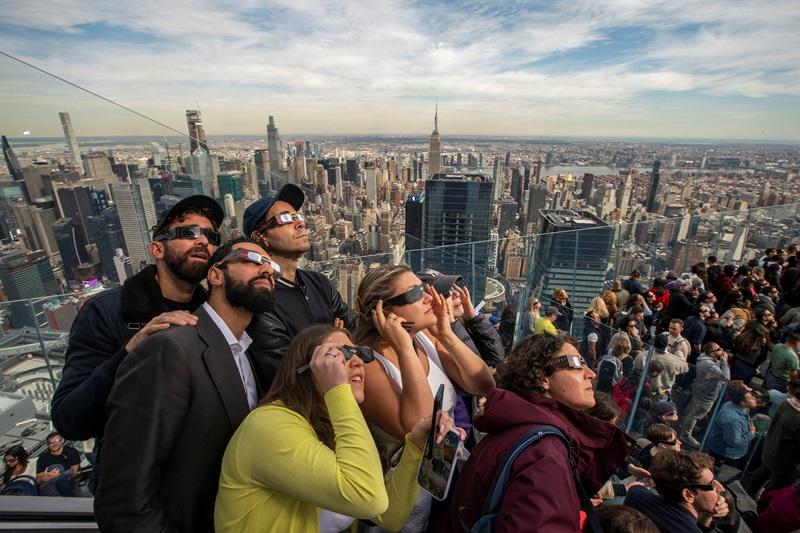With awe and nuptials, North Americans celebrate total solar eclipse

NORTH HUDSON, New York - People across North America - from a Mexican seashore to breathtaking Niagara Falls on the U.S.-Canada border - cast their eyes skyward on Monday for a total eclipse, cheering the celestial show and, in Arkansas, getting married en masse.
Where clear skies prevailed, observers along the direct path of the eclipse were treated to the rare spectacle of the moon appearing as a dark orb creeping in front of the sun, briefly blocking out all but a brilliant halo of light, or corona, around, the sun's outer edge. (Reuters live coverage)
It was North America's first total eclipse since 2017.
As totality hit at a campground in North Hudson in upstate New York, hundreds of people shrieked with excitement.
"Oh my God!" some said, as the temperature dropped and outdoor lights on a nearby building flicked on, fooled by the darkness.
Mexico's beachside resort town of Mazatlan was the first major viewing spot along the "path of totality." Thousands of people thronged the coastal promenade, perched in deck chairs with solar-safe eyewear, and an orchestra played the "Star Wars" movie theme as skies darkened under the approaching lunar shadow.
The crowds burst into cheers, applause and whistles when the eclipse reached totality.
Countless eclipse-watching events were being convened at bars, stadiums, fairgrounds and parks. At Niagara Falls, people viewed the eclipse next to the roaring waterfall, with hundreds dressed in costumes to look like the sun.
The period of totality, lasting up to 4-1/2 minutes depending the observer's location, was ushered in by a number of other eerie eclipse effects. Some stars twinkled at midday as dusk abruptly descended, sending temperatures dipping and faint waves of "shadow bands" flickering over the landscape. Birds and other wildlife sometimes fall silent and still.
Eclipse fans traveled from far and wide hoping to glimpse the phenomenon somewhere along the "path of totality" stretching 2,500 miles (4,000 km) from Mexico's Pacific Coast through Texas and across 14 other U.S. states into Canada. The moon's shadow was expected to exit continental North America in Newfoundland.
A partial eclipse, in which the moon obscures only a portion of the sun, unfolded across most of the continental United States, outside the path of totality.
There were many different kinds of celebrations. Nearly 400 couples tied the knot in the shadow of the moon in a mass wedding event in Russellville, Arkansas, dubbed "Elope and the Eclipse."
Lourdes Corro, 43, said she traveled 10 hours by car to reach Mazatlan for an event widely considered one of nature's greatest wonders.
"The last one I saw was when I was 9 years old," Corro said. "There are a few clouds but we can still see the sun."
'Complete sensory experience'
Overcast skies across much of the United States added an extra challenge for many.
Laura and Brian Uzzle were awaiting the eclipse on the banks of the Ohio River between Indiana and Kentucky on Monday after cloudy forecasts prompted the Denver-based couple to abandon their initial plan of viewing it in Texas and book last-minute flights and rental cars several hundred miles away.
Laura Uzzle, 56, said she was excited to experience the eclipse by a riverbank teeming with birds and insects.
"Even the wildlife changes," she said. "It's a complete sensory experience."
At up to 4 minutes and 28 seconds, the total eclipse surpassed the duration of the 2017 one that lasted upwards of 2 minutes and 42 seconds. According to NASA, solar eclipse totalities can range from 10 seconds to about 7-1/2 minutes.
Monday's total eclipse rolled through more densely populated regions than seven years ago, a corridor averaging 115 miles (185 kms) wide encompassing such major cities as San Antonio, Austin and Dallas, Texas; Indianapolis, Indiana; Cleveland, Ohio; Erie, Pennsylvania; and Montreal, Quebec.
Experts urged the use of protective solar glasses to prevent eye damage that would otherwise occur from looking directly at the sun. Only during the few minutes of totality could the sun can be safely viewed without such eyewear, they said.
About 32 million people in the United States live within the path of totality, with federal officials predicting another 5 million people would travel to be there.
Small rural towns bustled, such as Advance, Missouri, home to just over 1,300 people, where Tim and Gwen Wurst had driven from their Kansas City home after checking weather forecasts. They had thrilled to witness a partial eclipse in 2017 and were excited for totality.
"It's been on the calendar for years," said Tim Wurst, 62.
It took about 80 minutes from the moment the moon first began to cover the sun to the moment of totality, then another 80 minutes to complete the process in reverse.
The last remaining bit of brilliant sunlight before totality creates a "diamond ring effect" in which a single bright spot appears along the lunar edge even as the sun's corona leaves a ring of light around the moon. — Reuters




